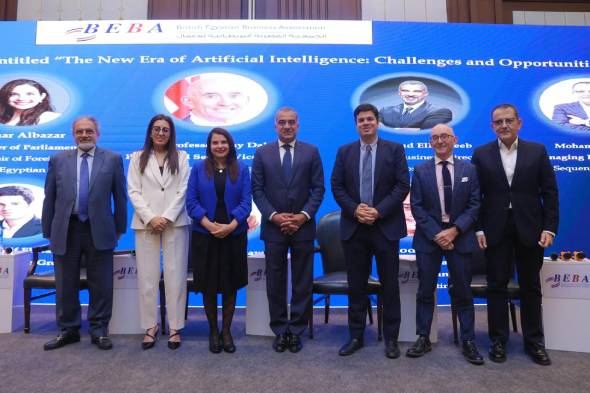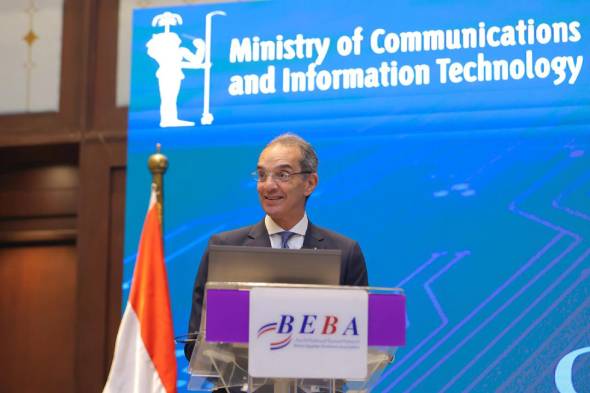MCIT Minister delivers insights into Egypt’s National AI Strategy
Cairo 24 April 2024: The British Egyptian Business Association (BEBA) has organised on Tuesday a special event in honour of H.E. Dr. Amr Talaat, Minister of Communications & Information Technology, who gave a keynote speech followed by a panel discussion entitled “The New Era of Artificial Intelligence: Challenges & Opportunities.”

Before H.E Dr. Amr Talaat gives his keynote speech, Eng. Khaled Nosseir, BEBA Chairman, delivered welcome remarks to the esteemed guests, notably Minister Byung Kwan Kim, Chargé d'affaires of the South Korean Embassy in Cairo; Dr. Sherif Samy, former Chairman of the Egyptian Financial Regulatory Authority (FRA); Dr. Sherif Mohamed Farouk, Chairman of the National Postal Authority; Eng. Ali Issa, Chairman of the Egyptian Businessmen’s Association (EBA); and Mr. Mohanad Khaled, Chairman of the Egyptian-British Chamber of Commerce.
In his keynote speech, His Excellency Dr. Amr Talaat provided valuable insights into Egypt’s national artificial intelligence strategy. In 2019, the Egyptian government formed the National Council for Artificial Intelligence, where all stakeholders are members, as a partnership between governmental institutions, prominent academics, and practitioners from leading businesses in the field of AI. He further mentioned that Egypt has vast data from all digitisation systems operating in the country for decades. He also highlighted that Egypt's ranking in the Government AI readiness issued by Oxford Insights has improved by more than 49 places, jumping from the 111th position to the 62nd between 2019 and 2023. However, the ministry is seeking to strengthen its position further after the launch of the second phase of the National AI Strategy 2024-2029.
“We believe definitely Egypt deserves … way better of a rank than 62. And this is one of the aims of phase two of our (national AI) strategy.”

The second phase of the strategy aims to improve government performance, enhance investment, increase public awareness of AI, attract investments for data centers, create innovative working environments, enable the management of the stages of the local data life cycle, develop AI capabilities, and build a technological platform based on the development of big data technology. Egypt has launched several initiatives and platforms for AI training and education, including the Mahara-Tech platform. This platform aims to support Egyptian and Arab youth in starting or advancing their information technology careers by offering high-quality educational content delivered by IT experts.
“Data is the new natural resource. It is becoming the bloodline of AI.” H.E Dr. Amr Talaat said, stressing that the ethics of AI and the neutrality of “the data that is feeding the AI” is extremely pivotal issue that needs to be addressed through setting rules and regulations for copyrights and data protection.
Following the minister’s remarks, a panel discussion started, including eight high-profile officials namely; Marwa Abbas, General Manger at IBM, Sahar Albazar, Egyptian Parliament Member and Deputy Chair of the Foreign Affairs Committee, Mahmoud El Khateeb, VP, Business Director at Vodafone Egypt Professor, Guy Daly, Provost and Senior Vice-President at The British University in Egypt (BUE), Ahmed Tantawy, a senior advisor to the Egyptian Minister of Communications and IT and the Founding Director of the Applied Innovation, Mohamed Fahmy, Managing Director & CEO at Sequence Ventures, Tarek Seif El Nast, Head of Venture Growth at Falak Startups, , and it was moderated by Karim Refaat, Chairman, N Gage Consulting.
The panel discussion was mainly focused on the benefits of AI as well as its hazards and risks. Marwa Abbas said that IBM has been operating in Egypt for 70 years at the heart of the IT sector, including 12 years in the AI. She added that her company believes that AI is all about alliances, being open to collaborations, policy and regulations, noting that it is making sure that the outcomes are explainable, attractive and comprehensive to end users. IBM is embracing green AI while taking a human-centric approach to AI to advance its capabilities while adopting ethical practices.
Furthermore, Professor Guy Daly, Provost and Senior Vice-President at The British University in Egypt said that BUE believes in presenting a student-centric education in which Artificial Intelligence is key.
Mahmoud El Khateeb,VP Business Director at Vodafone Egypt, also noted that there is a need to get prepared for all the risks of AI to ensure readiness and preparations for all the challenges that may arise. He emphasised that the government and the private sector required to cooperate in building data centres and that he has faith in the Egyptian eco-system and startups which can attract foreign direct investments.
Moreover, Ahmed Tantawy, Senior Advisor to the MCIT Minister, clarified that the governments are required to make their own reaches to make use of the emerging technology solutions, particularly the AI. He also shed light on the applications of AI technologies in the healthcare sector such as the curing of cancer and the screening of diabetes, mentioning that need for data from Egypt to develop specially tailored solution. He stressed that the government is entitled to make indirect investments into the industry.
On the other hand, Tarek Seif El Nasr said that he first learned about the AI at the World Chess Champion, clarifying that the main challenges facing the startups in Egypt is finding a training model in Arabic with different dialects, which is what they are working on at Falak Startups. He also mentioned the necessity allocating more finances for AI solutions just as the government of Saudi Arabia which plans to create a fund of about $40 billion to invest in artificial intelligence. He noted that the planned tech fund would make Saudi Arabia the world’s largest investor in artificial intelligence which reflects the importance of AI.
However, Mohamed Fahmy, Managing Director & CEO at Sequence Ventures said that the government should increase its investments in the AI technologies and that it needs to work on the integration with the private sector to foster this industry. With strategic government investments and the right talent, Egypt has all the tools necessary to innovate and lead, he concluded.